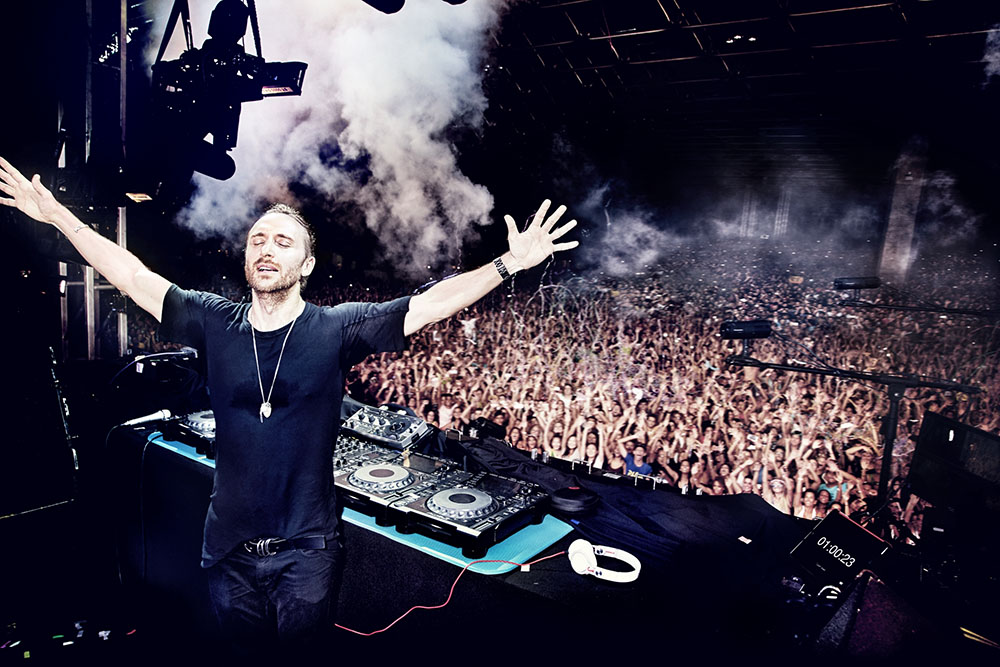David Guetta: The DJing D'Artagnan
Grammy-winning music producer tells The Week Portfolio how he got his start in music

A free daily email with the biggest news stories of the day – and the best features from TheWeek.com
You are now subscribed
Your newsletter sign-up was successful
David Guetta is arguably the world's most cheerful DJ. one of his country's biggest musical exports, the Frenchman makes 140 public appearances per year on average, including TV and radio engagements as well as DJ sets around the world, from Las Vegas to Ibiza, and has been entertaining club-goers for more than 20 years. You might expect Guetta to appear worn down or weathered by this unrelenting party lifestyle, but at 48 he is as energetic and enthusiastic as ever.
Sporting a short-trimmed beard and wispy, shoulder-length hair, Guetta has the look of a modern- day musketeer – a DJing D'Artagnan whose en garde position is an alacritous air punch to welcome a crowd of thousands, whether at Ibiza clubs Pacha and Ushuaïa, where he holds summer residencies; or at the Stade de France, where in July he performed at the opening and closing ceremonies of Euro 2016. "I've kept on living the way I did when I was 20," he says. "I don't have any other choice, and it's perfect."
As a music producer, Guetta has two Grammys under his belt and a string of chart-topping dance hits with megastars such as Sia, Nicki Minaj, Usher and Rihanna. Unlike these collaborators, he is refreshingly insouciant when it comes to his image. He's a happy soul, which makes him something of a celebrity anomaly these days, and while he may wear sunglasses in the dark and twist his hair into a man bun now and again, Guetta doesn't take himself too seriously. You'd be hard pressed to find a picture of him not flashing a smile from behind the decks. His ebullience belies the fact that he's been DJing for 31 years, having cut his teeth in the nightclubs of Paris while still a teenager. "The first time I played in a club was when I was 17. It was vinyl, and I was shaking so much that I couldn't put the needle on the record," says Guetta, recounting wild adventures at nocturnal institutions like La Palace, which was famously inaugurated in 1978 with a performance by Grace Jones. "I was playing in the basement and it only had a little hole to see the feet of the people dancing above," he recalls. Later, in 1994, Guetta and his then wife Cathy – they divorced in 2014 – briefly took over the club and renamed it Kitkat.
The Week
Escape your echo chamber. Get the facts behind the news, plus analysis from multiple perspectives.

Sign up for The Week's Free Newsletters
From our morning news briefing to a weekly Good News Newsletter, get the best of The Week delivered directly to your inbox.
From our morning news briefing to a weekly Good News Newsletter, get the best of The Week delivered directly to your inbox.
In the late '90s, it was his residency at Les Bains Douches – now a luxury boutique hotel, but once France's answer to Studio 54 – that turned Guetta into a star, on home turf at least. He and Cathy became fixtures on Paris' jet-set scene, which in turn marked his transition from entertainer to influencer and impresario. "When I first played at Les Bains, the DJ booth was in a different room," he says, recounting one of his first gigs at the club. "Every time I played a record, I would open the door, go out and look at the dancefloor to see if [the music] was working!"
Endearing himself to the club-going elite of '90s Paris was just a stepping stone towards plugging electronic dance music into the mainstream. "Club owners saw that I was playing good music, so they kept booking me. This was the first step of the evolution. Then, as well as playing other people's records, I became an artist performing his own music on stage. That's a whole different game. This is a real DJ background. Today, DJs can come from their bedrooms; they're incredible producers, but they go from [internet stars] to performing to 30,000 at a festival. This can be weird."
Despite his own career metamorphosis, Guetta loves the company of new talent. "The thing is, when I'm with people my age, it feels strange because I still have that kind of club life," he says.
Immersing himself in Ibiza's millennial club scene helped to springboard Guetta into the commercial charts, although it took a further 10 years for America to take stock of his European success. Indeed, he has only experienced fame in the superstar sense for a decade, which can today be quantified by more than two billion streams on Spotify, nine million album sales and close to 21 million followers on Twitter. Not bad for someone who used to watch the party unfold through a basement peephole.
A free daily email with the biggest news stories of the day – and the best features from TheWeek.com